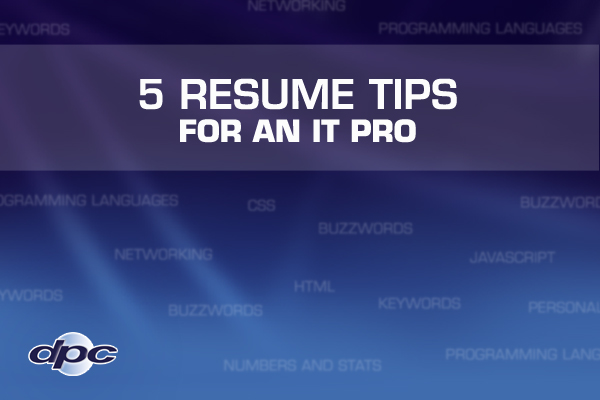Five Resume Tips for the IT Professional
Information technology positions–whether you’re looking for a role as a programmer, network administrator or embedded engineer–are some of the most coveted in the job market today.
If you’re in the midst of a job search and need to make sure your resume shines, here five ways you can distinguish yourself before submitting your next application.
1. Make programming languages keywords (and include how you used them)
Be sure to include the programming languages that relate to the job you want. Be sure languages such as C++, HTML and Javascript are highlighted as buzzwords as skills on your resume. This is important because many companies use automated software that scans your resume for the skills that their clients are specifically looking for in a candidate. As an example, if a company is looking to hire a programmer based on the keyword “HTML,” you should optimize your resume on that keyword.
Instead of saying this on your resume… “experienced in web development and the use of SQL,” say this, “restructured employer site using HTML to decrease page load time by 30%.”
2. Quantify the impact of your technical work
If listing your experience according to skills you’ve acquired and used does not translate into a sure fire interview, maybe numbers and stats can. Quantify your accomplishments as the direct result of your work whether that’s the number lines of code debugged or machines administered. Hiring managers will see these as examples of ROI.
3. Exemplify your understanding of networking basics
Even though it may seem obvious that you have experience and familiarity with common networks and the terms associated with them, you should definitely list these in your resume if you’re interested in a network-related position. While these are not going to distinguish a resume, they will help get you found in initial searches, so be sure to include the following terms:
- TCP/IP and IP addressing
- Network Address Translation and Port Address Translation
- IP telephony: packet vs. switched
- Routers, switches, and firewalls
4. Mention professional conferences you attended
You’re a tech-savvy pro. And you aspire to make yourself a better developer, programmer, or engineer. If you’ve attended conferences, employers will be impressed by your professional drive to improve your skills, keep yourself up to date on technology, and your interest in networking with other professionals. Why not include this in your resume? Heck, you may have even attended the same conferences as the person reviewing applicants.
5. Include a link to your personal website (and have a personal website)
Your potential employers want to get to know who you are. So why not make this incredibly easy for them by developing a personal website to market yourself? The site can be a showcase of your portfolio including screen shots of sites developed or code examples. A supplemental blog can also show that you’re keeping up with industry trends and maybe even acting as a thought leader in your space.
Sources: http://www.snc.edu/career/docs/technicalresume.pdf, http://career-advice.monster.com/resumes-cover-letters/resume-writing-tips/Resume-Tips-for-Technology-Pros/article.aspx, http://career-advice.monster.com/resumes-cover-letters/resume-samples/sample-resume-computer-programmer-experienced/article.aspx, http://www.globalknowledge.com/training/whitepaperdetail.asp?pageid=502&wpid=589&country=United+States, http://blog.virtualglobebook.com/2011/06/resume-tips-for-computer-science.html
